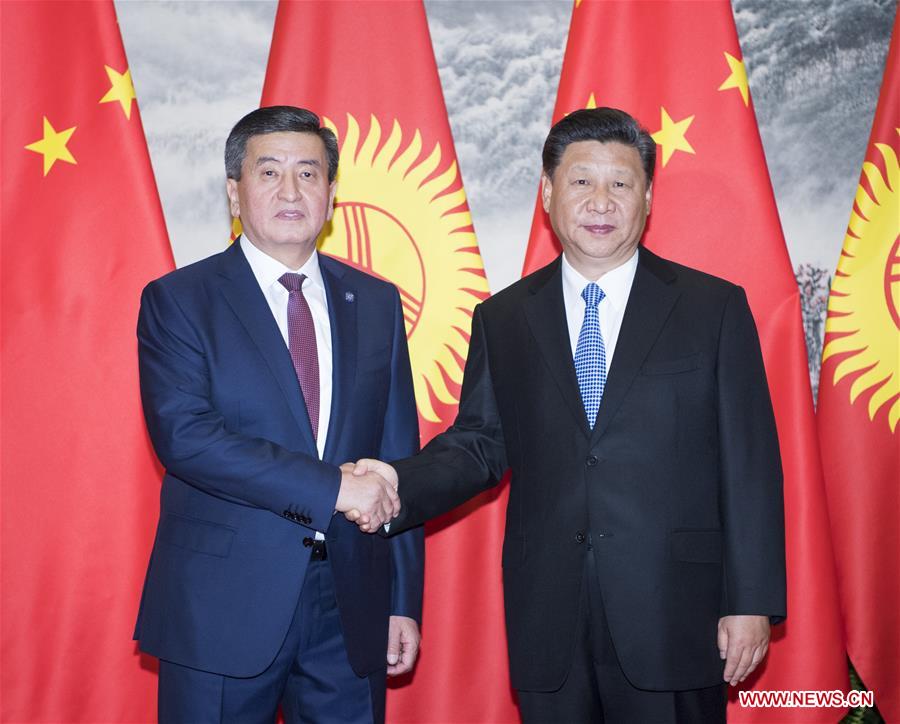
President Xi Jinping (R) holds talks with Kyrgyz President Sooronbay Jeenbekov at the Great Hall of the People in Beijing, June 6, 2018. [Photo/Xinhua]
Trip will include bilateral talks with leaders of nations at regional organization's meeting
China will sign an array of cooperation agreements with Kyrgyzstan and Tajikistan during President Xi Jinping's state visits to the two Central Asian countries to further strengthen their ties, a senior diplomat said on Monday.
As an important outcome of Xi's visits, Beijing will also sign a joint statement with each country on furthering their comprehensive strategic partnerships, Vice-Foreign Minister Zhang Hanhui said at a news briefing.
Xi will also attend the 19th meeting of the Council of Heads of State of the Shanghai Cooperation Organization in Bishkek, the Kyrgyz capital, during his stay from Wednesday to Friday, as well as the fifth summit of the Conference on Interaction and Confidence Building Measures in Asia in the Tajik capital of Dushanbe during his visit from Friday to Sunday.
The visits come a few weeks after Xi's meetings with Kyrgyz President Sooronbay Jeenbekov and Tajik President Emomali Rahmon in Beijing at the end of April during the Second Belt and Road Forum for International Cooperation.
In the face of the changing international situation, relations between China and the Central Asian countries maintain sustained, stable and healthy development, Zhang said, adding that ties between China and the two countries are at their best in history and are facing broad prospects for development.
"President Xi's visits will further cement the political foundation of ties between China and Kyrgyzstan as well as that between China and Tajikistan, map out a new blueprint for the joint building of the Belt and Road and translate their high-level political mutual trust into more substantial cooperation outcomes," Zhang said.
Besides their cooperation in infrastructure investment under the framework of the Belt and Road Initiative, he said, China will facilitate imports of agricultural products such as soybeans and grains from the Central Asian countries to its huge market.
"Priority will be given to the agricultural and husbandry fields in future cooperation between China and the Central Asian nations," he added.
Xi will also have a series of bilateral meetings with some of the leaders of other countries attending the SCO summit, and he will exchange views with them on bilateral ties as well as the major international issues of common concern, Zhang said.
One prominent problem in international relations is trade protectionism and unilateralism, Zhang said, so it's not strange that trade issues will be an important subject for bilateral meetings between Xi and the foreign leaders.
"Dealing with the economic bullying, trade protectionism and unilateralism of the United States is not just the business of China, it also matters to the recovery of the world economy," Zhang said.
Regarding the future development of the SCO, Zhang said the short-term goal of the regional organization is to build a community of development and security while its long-term goal is to build a community with a shared future.
The "Annual Report on the Shanghai Cooperation Organization (2019)", released by the Chinese Academy of Social Sciences on Monday, highlighted the challenges the regional body is facing due to unilateralism, protectionism and terrorism against the backdrop of increasing global uncertainty and instability.
The report said political mutual trust among the SCO members has been strengthened and high-quality development of the BRI has injected fresh impetus into the member states' cooperation.
As a significant force for advancing global governance, the SCO has effectively safeguarded the security, stability and development in the region, it said.
|






7740f3b5-9ecb-438e-9052-76cb2d4bb671.jpg)

